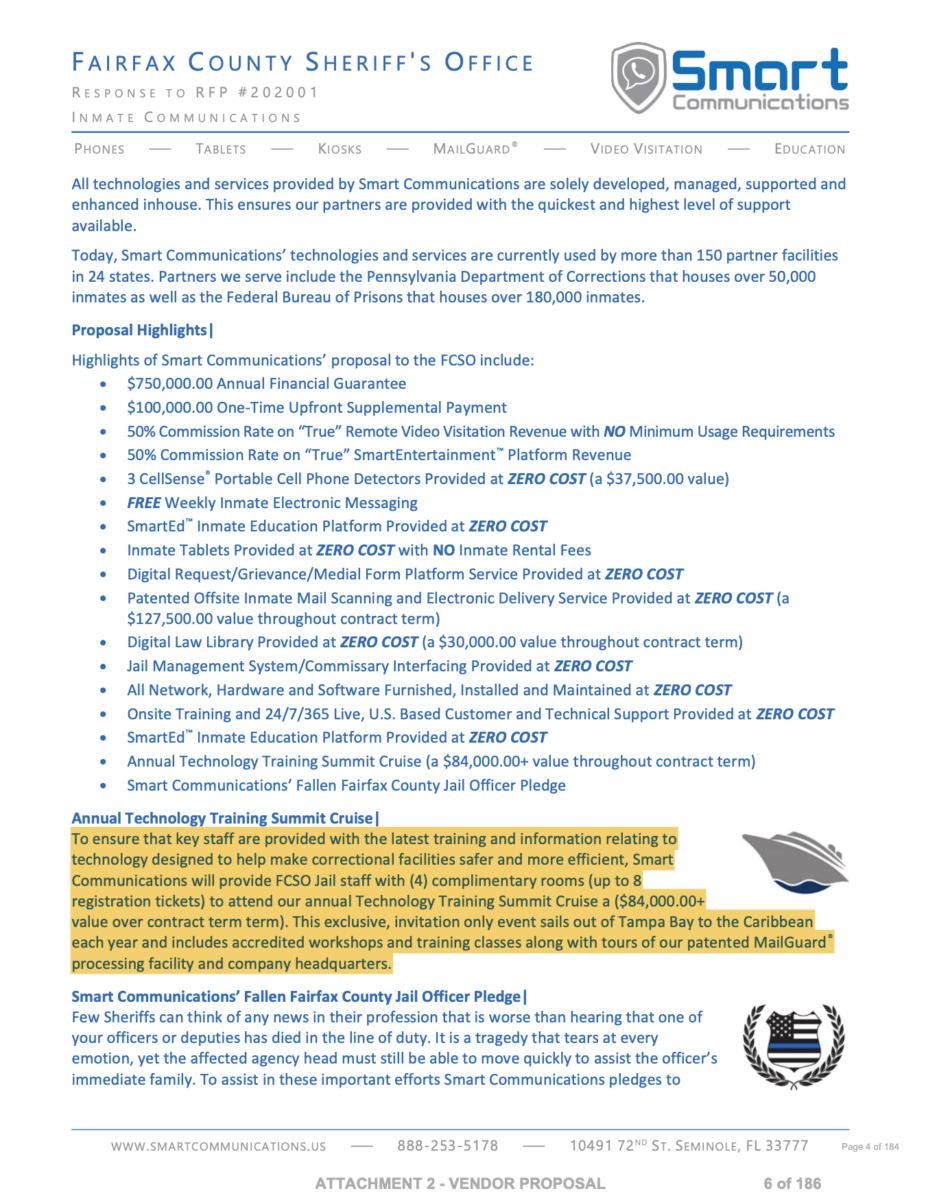Sheriffs Offered Caribbean Cruises and Florida Retreats as Part of Jail Telecom Contracts
Smart Communications, a for-profit Florida company that sells phone, videochat, and email-like services to prisons and jails, told at least one sheriff’s department that it can live “the resort life” on a trip to Florida.

Members of five sheriffs offices across the country were offered cruises from “Tampa Bay to the Caribbean” as part of jail telecommunications contracts with the vendor Smart Communications, according to documents obtained by The Appeal.
Smart Communications is a for-profit company that sells communications services including phone, video call, and email-like messages to people incarcerated in publicly funded prisons and jails. It contracts with the public agencies that operate those facilities, often sheriffs offices, to secure the exclusive right to operate within them. Its Florida-based CEO and founder, Jon Logan, is already controversial among critics of the criminal legal system—Logan has faced scrutiny for posting lavish images of himself on Instagram on board his yacht, driving luxury cars, and wearing expensive suits, among other high-end pursuits funded by selling expensive communications services to incarcerated people. In the Fairfax County Adult Detention Center, Smart Communications charges people $3.00 for a 30-minute video call, $.50 per electronic message, and $1.00 per electronic image.
Activists and families of incarcerated people have long criticized Smart Communications’ digitized mail services—which scan hard copies of prison mail, create searchable databases of imprisoned people’s communications, and prevent imprisoned people from receiving original versions of items like birthday cards or drawings from children—as invasive and lacking humanity.
But some of the company’s other offerings are sure to irritate legal reformers: trips to Florida and cruises that set sail from Tampa Bay. The sheriff’s offices of Washoe County, Nevada; Fairfax County, Virginia; Webb County, Texas; Brazos County, Texas; and Dawson County, Georgia—five counties for which The Appeal was able to obtain contract data—gave Smart Communications contracts to operate telecommunications services in jails. As part of the bidding process, Smart Communications’ proposals promised “complimentary rooms” for sheriff’s department staff on an “Annual Technology Training Summit Cruise” that “sails out of Tampa Bay to the Caribbean” each year. The documents say the cruise provides sheriff’s office staff with “accredited workshops and training classes.”
In a 2021 email obtained by The Appeal, a Smart Communications employee offered employees of the Dawson County Sheriff’s Office a free trip to the company’s annual training summit in Tampa, Florida from April 6 to 8 of that year. That event, however, did not appear to include a cruise ship.
Representatives for the Fairfax County, Washoe County, Dawson County and Brazos County Sheriff’s Offices said that members of their departments have not attended and will not be granted permission to attend any Smart Communications cruises, despite their contracts allowing them to do so. The Webb County Sheriff’s office did not respond to multiple requests for comment.

In some cases, contracts included language explicitly verifying an office’s right to complimentary tickets to the cruise as described in Smart Communications’ vendor proposal. The Fairfax County Sheriff’s contract, for example, reads: “Customer shall have the capability to send up to 8 individuals… to attend the Annual Training Summit.” A proposal from Smart Communications stated that the complimentary tickets were at least an $84,000 value.
In other cases, the right to attend the training cruise was not explicitly stated in the contract. The Washoe County contract mentions that Smart Communications will “Provide initial and on-going training for… staff.”
In at least one case, Smart Communications’ cruises even drew scrutiny from a rival prison telecom provider. In an email obtained via a public records request, Bill Pope of NCIC, a different firm that operates phones in prisons, contested Washoe County’s award of its telecom contract to Smart Communications. Pope complained to a county employee that he was told that he was not allowed to give out free binders to county staff, as they would be considered “gratuities.”
“In Smart Communications’ RFP response… cruises valued up to $105,000 have been offered to Washoe County employees and family members,” Pope wrote. “Would this not also be considered a gratuity?”
The offices mentioned in this story may not represent all sheriffs entitled to Smart Communications’ trips. The company contracts with at least 100 government agencies according to its website. Of that number, The Appeal reached out to 26 of those agencies. The Appeal was able to obtain documentation for five government counties.
The jails in those five counties—the Fairfax County Adult Detention Center, the Washoe County Detention Facility, the Brazos County Detention Center, the Webb County Jail, and the Dawson County Detention Center—incarcerated approximately 3,000 people in 2018, according to federal data. According to a report from the Ella Baker Center for Human Rights, more than one in three families of incarcerated people go into debt to pay for calls and visits to prisons.
Asked to comment on Smart Communications’ promises of Caribbean cruises in its vendor proposals and telecom contracts, elected officials and activists were alarmed.
Virginia State Delegate Patrick Hope, who represents Virginia’s 47th District, which includes the Fairfax County Sheriff’s office, told The Appeal that “[c]omplimentary Caribbean cruises are not complementary. These so-called ‘training summit cruises’ are paid for through a mark-up in the jail contract. This is a gross mishandling of funds that … come mostly from low-income families… It may be legal but it’s a loophole in the law that should be closed.”
Bianca Tylek, Executive Director of Worth Rises, a nonprofit with a long history of activism on prison telecom issues, told The Appeal that the offers of cruises are troublesome.
“In some senses this is not surprising,” she said. “For many sheriffs, kickbacks are almost an accepted part of practice. Kickbacks from these companies are like legal bribery. But there’s something particularly grotesque about the idea of offering vacations on the backs of people who are incarcerated and suffering.”
In response to an inquiry from The Appeal, Logan, Smart Communications’ CEO, stated that the technology summit cruises have never occurred.
“There has never been a technology summit cruise,” he said via email. “So, I’m not sure what you could write about something that has never happened?” Asked why cruises are mentioned in proposals to government agencies if the “cruise has never happened or is not going to happen,” Logan did not respond directly.
He added instead that the company has “never done a summit cruise. We do however have technology summits all the time that we provide to agencies, both customers and non-customers of Smart Communications… We view this as a win-win to inform agency leaders on new technologies and also learn what pain points they have so we can help innovate new technologies.”
Logan added that The Appeal was “welcome to come visit me at our headquarters in Florida and join a technology summit and be part of the future of incarceration innovation and reform with us.”
Smart Communications’ offer of Caribbean cruises is one of the most lurid examples of a decades old phenomenon of prison and jail telecom providers offering kickbacks as part of government contracts.
Wanda Bertram, a spokesperson for the Prison Policy Initiative, told The Appeal that the company’s actions are indicative of a larger trend within the prison contractor industry.
“Smart Communications is the most shameless actor in an industry full of companies that have become increasingly more creative in the kickbacks they offer to jails,” she wrote.
Shawn Weneta of the Virginia ACLU took care to point out that culpability for the system as it exists lies not just with unscrupulous companies, but also with the public officials who continue to contract with them. Speaking about the Fairfax County Sheriff’s decision to work with Smart Communications, he alleges, “There’s a reason why phone calls in prisons and jails are so expensive.” He added: “And it’s not because the vendors who win contracts are providing the best service and rates to poor families. It’s because the phone provider has to provide sheriffs and their staff with Caribbean cruises.”
Smart Communications is far from the most significant player in prison telecommunications in the United States. It operates in 115 facilities compared to the thousands that for-profit behemoths like GTL and Securus, which offer multiple services including phones, video visits, tablets, and email for incarcerated people, operate in.
In the last few years, several major cities have made prison calls free. Last year, Connecticut became the first state to make calls free entirely. Currently, the FCC can cap the cost of interstate calls, which it has restricted to a maximum of 21 cents per minute, but cannot regulate in-state calls, video, or messaging, which constitute a majority of prison and jail communication. In March a bill advanced out of the U.S. Senate’s Commerce, Science, and Transportation Committee that would allow the FCC to address these issues. The Senate has yet to hold a full vote on the measure.
While the cruises may not actually take place, Logan made it clear to that Smart Communications regularly holds training summits. Invitations include all-expense paid offers to attend these summits. These events, Logan assured The Appeal, happen regularly.
An invitation sent to a member of the Fairfax County Sheriff’s office includes a picture of a jet ski. Smart Communications’ Logan said in a statement that receiving complimentary invitations to such training events are “in no way contingent on doing business with Smart Communications.”

In 2021, a representative for Smart Communications emailed the Dawson County Sheriff’s Office in Georgia to offer a “complimentary training event (… including travel, hotel accommodations, meals & excursions) held at our headquarters in Tampa Florida April 6th-8th!” At the end of the message, the company noted that attendees will be “Living the resort life.”
